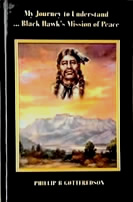The writer is Indigenous Day Award recipient Phillip B Gottfredson, the author of My Journey to Understand Black Hawk's Mission of Peace.
by Phillip B Gottfredson
History reveals an undeniable fact that settler colonialism forced Indigenous peoples of Utah to choose between giving up their land and culture, assimilating into the dominant white culture, or die. The consequences of such assimilation efforts have caused irreversible damage to humanity. When educators exclude Native American history from the curriculum, they are perpetuating settler colonialism, which must end.
Throughout my two-decades-long research into the history of First Nations in Utah, I have repeatedly encountered disheartening false narratives that perpetuate harmful stereotypes and place blame on Native communities. The same old refrain echoes, "We have given the Indians every opportunity to succeed, yet they choose a life of dependency on government support, succumbing to addiction, poverty, and despair. It's their own fault." This assertion couldn't be further from the truth. For over a century and a half, Indigenous people of Utah, and nationally, are wards of the Government, not by choice but by force. It's our responsibility to challenge these harmful stereotypes and work towards a more accurate and respectful portrayal of Indigenous communities.
Professor Dr. Daniel McCool, University of Utah, said, "We took from them almost all their land—the reservations are just a tiny remnant of traditional tribal homelands. We tried to take from them their hunting rights, their fishing rights, the timber on their land. We tried to take from them their water rights. We tried to take from them their culture, their religion, their identity, and perhaps most importantly, we tried to take from them their freedom." "We took from them almost all their land—the reservations are just a tiny remnant of traditional tribal homelands. We tried to take from them their hunting rights, their fishing rights, the timber on their land. We tried to take from them their water rights. We tried to take from them their culture, their religion, their identity, and perhaps most importantly, we tried to take from them their freedom."
Quoting from
the Salt Lake Tribune article by Lisa Shencker November 25, 2009: For many people of color, education - far from being a tool
for uplift -
was a bludgeon, designed to strip culture, difference,
language from
non-white children and to "civilize" them with the master
narrative of
U.S. history. For Native people, this calculated cultural
genocide was
done with force, as Native children were taken from their
families and
sent to government boarding schools designed to "Kill the
Indian, Save
the Man."
For about 100 years, ending formally in the 1930s but
continuing until
the '70s, Native boarding schools used coercion and often
abuse to force
children to lose their connection to their languages,
cultural
traditions and families. As an elder, Lone Wolf, Blackfeet,
recalled in
the 1890s, "School wasn't for me when I was a kid. I tried
three of them
and they were all bad. The first time was when I was about 8
years old.
The soldiers came and rounded up as many of the Blackfeet
children as
they could. The government decided that we were to get the
White Man's
education by force.
"It was very cold that day when we were loaded into the
wagons. None of
us wanted to go and our parents didn't want to let us go.
Oh, we cried
for this was the first time we were to be separated from our
parents.
Nobody waved as the wagons, escorted by the soldiers, took
us toward the
school at Fort Shaw. Once (we got to the boarding school)
our belongings
were taken from us, even the little medicine bags our
mothers had given
to us to protect us from harm. Everything was placed in a
heap and set
afire.
"Next was the long hair, the pride of all the Indians. The
boys, one by
one, would break down and cry when they saw their braids
thrown on the
floor. All of the buckskin clothes had to go and we had to
put on the
clothes of the White Man. I remember one evening when we
were all lined
up in a room and one of the boys said something in Indian to
another
boy. The man in charge caught him by the shirt and threw him
across the
room. Later we found out that his collar bone was broken.
The boy's
father, an old warrior, came to the school. He told the
instructor that
among his people, children were never punished by striking
them."
Is it any surprise, then, that with the legacy of this
oppressive
system, Native students continue to be at the greatest risk
of dropping
out of school? The 2001 McDowell Report on Alaska Native and
Native
education says, "American Indian and Alaska Native students
are
considered the most at-risk for failing to complete high
school and
college. Whatever the reasons for leaving school, dropout
rates are
symptomatic of the failure of an educational system that
refuses to
accept cultural differences as a strength rather than a
weakness."
"These kids are living in Utah, and they need to know the whole
story," said Elizabeth Player, curriculum coordinator for the Utah
Indian Curriculum Project at the American Advertisement West Center
at the University of Utah. "If we miss out on the first people in
our state and their current status, we're missing a huge piece of
that puzzle as to who we are as Utahns."
"Too often, museums and other institutions portray Indians as they
do the dinosaurs, like we're dead and gone," said Forrest Cuch,
former director of the state Division of Indian Affairs. "But we're not."
"I feel like I can finally do it justice," said Quinn Rollins, a
seventh-grade teacher at Bennion Junior High in Taylorsville."
Tiana
Tollestrup, an eighth-grader at Crescent View Middle School in
Sandy, said she's eager to learn more about her own heritage and
American Indian historical figures.
"We learn about other backgrounds and a lot about how they lived and
their history," Tollestrup said. "I think it would be great if we
learned about ours."
Damon Pitts, a senior at Jordan High in Sandy, said he thinks it
might give American Indian students a reason to do better in school.
He said what he's learned as part of his school's Standing Tall
program, which mentors American Indian students, has already helped
him.
"It gave me a boost to do better, to know that someone cares," Pitts
said.
Utah failing to educate Indian kids, report says
By Stephen Speckman
Deseret Morning News (Friday, September 19, 2003)
Utah is lagging behind several other states in its efforts to
educate American Indians, according to a report from the Utah
American Indian/Alaska Native Education State Plan Advisory
Committee. The advisory committee's study concluded that Utah is
behind Idaho, New Mexico, Arizona, California, Montana and
Minnesota, which have all mandated that their education systems
change their social studies core curriculum and counseling programs.
"Indian people are still suffering from and have
not healed from the North American conquest, nor the violent
struggle to settle Utah, predominantly by members of the LDS Mormon
faith." In order to educate Utah's American Indian children, it's
important for those youths to understand their past, "begin to heal"
and start believing in themselves, according to the report.
Another finding is that Utah's tribal communities continue to blame
failed economic and educational systems on or near reservations for
many problems within tribes. But the plan says the blame game
between schools, American Indian parents and their children needs to
stop.
"We have learned that for American Indians in the state of Utah,"
the plan says, "social dysfunctions are real and have a major impact
on education and what happens in schools." Among possible solutions,
it says some tribes, which have their own sovereign rights, are
willing to enter into agreements with the government to clarify
expectations between the state, tribes and school districts.
The report goes on to say a lack of "accurate and culturally
relevant curriculum" perpetuates stereotypes and contributes to low
self-esteem among Indian students. Administrators, counselors and
teachers, the group said, should have to demonstrate cultural
competency related to American Indians as a graduation requirement.
Native Education - By Naomi Isshisaka
"The only chance of saving any of this race, will be by
taking their
children, at a very early age, and educating them in our
habits, in a
situation removed from the contagion of Indian pursuits."
- William Tudor in Letters on the Eastern States, 1821
"How smooth must be the language of the whites, when they
can make right
look like wrong, and wrong like right."
- Black Hawk, Sauk, 1800s
Over the course of U.S. history, one of the most
intransigent battles in
the fight for equality and justice for people of color has
been in
access to quality, culturally relevant education.
To Educators:
Educators should avoid manipulative phases and wording such as "massacre," "victory," and "conquest" which distort facts and history.
Teach Native American history as a regular part of American History and discuss what went wrong or right.
Avoid materials and texts which illustrate Native American heroes as only those who helped Europeans and Euro-Americans, i.e. Thanksgiving.
Use materials and texts which outline the continuity of Native American societies from past to present.
Use materials which show respect and understanding of the sophistication and complexities of Native American societies. Understand and impart that the spiritual beliefs of Native American Peoples are integral to the structure of our societies and are not "superstitions" or "heathen."
Invite a Native American guest speaker/presenter to your class or for a school assembly. Contact a local Native American organization or your library for a list of these resources. Offer an honorarium or gift to those who visit your school.
Avoid the assumption that a Native American person knows everything about all Native Americans.
Use materials which show the value Native American Peoples place on our elders, children, and women. Avoid offensive terms such as "papoose", and "squaw." Use respectful language.
Understand that not all Native American Peoples have "Indian" surnames, but familiar European and Hispanic names as well.
Help children understand Native American Peoples have a wide variety of physical features, attributes, and value as do people of ALL cultures and races.
Most of all, teach children about Native Americans in a manner that you would like used to depict YOUR culture and racial/ethnic origin.
See: Utah Black Hawk War Timeline
|
